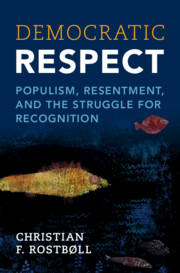Book contents
- Democratic Respect
- Democratic Respect
- Copyright page
- Dedication
- Contents
- Acknowledgments
- Introduction
- 1 Recognition and the Politics of Resentment
- 2 Respect, Esteem, and Solidarity
- 3 Rights and the Populist Claim for Recognition
- 4 Procedures, Outcomes, or Identification?
- 5 Respecting Disagreement
- 6 Publicity and Correcting Democracy
- Bibliography
- Index
5 - Respecting Disagreement
Published online by Cambridge University Press: 16 March 2023
- Democratic Respect
- Democratic Respect
- Copyright page
- Dedication
- Contents
- Acknowledgments
- Introduction
- 1 Recognition and the Politics of Resentment
- 2 Respect, Esteem, and Solidarity
- 3 Rights and the Populist Claim for Recognition
- 4 Procedures, Outcomes, or Identification?
- 5 Respecting Disagreement
- 6 Publicity and Correcting Democracy
- Bibliography
- Index
Summary
This chapter examines how different democratic decision-procedures – voting, majority rule, compromise, consensus, and public deliberation – relate to claims for recognition and democratic respect. Via a contrast with Rousseau and an explication of majority rule as a principle that regulates political decision-making over time, the chapter challenges the common view that populism is characterized by its unequivocal adherence to democratic principles of popular sovereignty and majority rule. The second part of the chapter discusses compromise as an attitude one can take when making decisions with one’s fellow citizens. Populists regard compromise as a form of betrayal, weakness, and defeat, while this chapter defends it as an important aspect of democratic respect. Political theorists have discussed whether the reasons for compromise are only pragmatic or whether they can also be principled. Populism’s principled rejection of compromise shows why our defense of this practice must be principled. The last part of the chapter connects the spirit of compromise to the notion of solidarity sketched in Chapter 2 and argues that compromise can be seen as a form of solidaristic inclusion of people with whom one profoundly disagrees.
Keywords
- Type
- Chapter
- Information
- Democratic RespectPopulism, Resentment, and the Struggle for Recognition, pp. 149 - 188Publisher: Cambridge University PressPrint publication year: 2023



